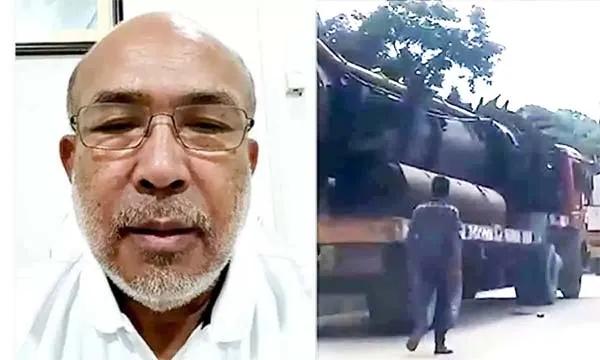Imphal: A day after the police registered an FIR against four members of Editors Guild of India (EGI), Chief Minister N. Biren Singh on Monday said that the EGI report on Manipur ethnic conflict is “biased and factually inaccurate”.
The Chief Minister said such kind of EGI report would create more problems in Manipur, which is rocked by ethnic violence for over four months killing 170 people and injuring 700 while displacing around 70,000 people of both Meitei and Kuki communities.
A three-member fact-finding team of EGI after visiting Manipur, published its report in New Delhi last week, claiming that the media’s reports on the ethnic violence in Manipur were one-sided, and accused the state leadership of being partisan.
“It should have avoided taking sides in the ethnic conflict but it failed to do its duty as a democratic government which should have represented the entire state,” the 24-page EGI report said in its conclusions and recommendations.
While talking to the media, the Chief Minister on Monday said that an FIR has been registered against the members of the EGI who are “trying to create more clashes in the state of Manipur”.
Before coming to a conclusion or publishing their report, the EGI team should have met the representatives of “all communities” and “not some sections or a selectitive section or people only,” Singh stated.
Those booked in the FIR are the President of the EGI, and three members – Seema Guha, Bharat Bhushan and Sanjay Kapoor, who visited Manipur last month to study media reportage of the ethnic violence and the circumstantial aspects.
Meanwhile, the Press Club of India in a statement strongly condemned lodging of a police case against three members of a fact-finding committee of the Editors Guild of India and its President on the media coverage of the ethnic clash and violence in Manipur.
Imphal-based social worker Ngangom Sarat Singh filed the FIR against the three EGI members who came to Manipur last month.
The FIR stated that the EGI report captioned a photo of a burning building in Churachandpur district as a “Kuki house”.
The building, however, was a Forest Department beat office that was set on fire by a mob on May 3, the day when large-scale violence broke out in the district along with other parts of the state.
The EGI, however, on Sunday, in a post on X (formerly Twitter) said : “There was an error in a photo caption in the report released on Sep 2. The same is being rectified and updated report will be uploaded on the link shortly. We regret the error that crept in at the photo editing stage.”
Sarat Singh in his complaint, however, alleged the EGI report has not mentioned key facts about large-scale illegal immigration to Manipur that threatens the indigenous people with a demographic change.
“The abnormal population growth in Manipur is also evident from the fact that the Census of 2001 has not been finalised for the nine hills subdivision of the state due to the abnormal decadal growth of the population up to 169 per cent,” he said in his 13-page complaint, which was registered in the Imphal police station in Imphal West district.
The complaint said that large scale illegal immigrants have been taking place into Manipur from the neighbouring countries — Myanmar, Bangladesh — and the records of the Census of India published in the year 1881, 1901, 1931, 1951, 1961, 1971, 1981, 1991, 2001 and 2011 and collective reading of all these would lead to the conclusion that the total number of growth of population of new Kuki and Mizos from 1881 to 2011 is a whopping 2505.29 per cent, which is an abnormal population growth in Manipur.
It said that Manipur has already miniscule population of about 28 lakhs as per the Census of 2011 which is also yet to be finalised.
Ration card beneficiaries of 6,06,813 have been deleted from the government records for failure to link the Aadhaar cards and these facts itself are very alarming and it proves the fact that there are various unaccounted populations existing in Manipur having illegally come from the neighbouring countries including Myanmar.
Recently, the Election Commission of India has identified 1,33,553 photo affixed names with similar entry in the electoral roll of the state and various steps have been taken to delete these duplicate voters in the records of the voters’ list, Sarat Singh said in his complaint.
—IANS

